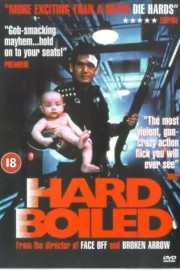Hard-Boiled
John Woo and Chow Yun-Fat remain one of the best director-actor collaborations in modern film, despite the fact that they haven’t worked together in nearly 20 years. Starting with the two “A Better Tomorrow” thrillers, Woo and Yun-Fat redefined the action genre with films as stylish as they were entertaining. When John Woo headed to America in 1993, sadly Chow Yun-Fat didn’t go with him; with the exception of “Face/Off” and 2002’s underrated “Windtalkers,” his American action films fell short of his instant classics like “The Killer,” “Once a Thief,” and “Hard-Boiled.”
It’s no surprise that America came knocking after “Hard-Boiled”; the film remains a remarkable action film, with epic action sequences, brilliant choreography, and every narrative theme Woo held most dear: honor, loyalty, friendship, and most importantly, a respect for human life that comes through no matter how many bullets fly. This is especially true in the film’s finale in a hospital, where renegade cop Tequila (Yun-Fat’s character) and undercover cop Alan (Tony Leung, who would later reunite with Woo for his 2009 masterpiece, “Red Cliff”) take on a massive gun-running cartel led by the ruthless Johnny Wong (Anthony Wong) at the source. It remains one of the greatest action sequences ever filmed.
Woo came up with the story for “Hard-Boiled,” which Barry Wong turned into a screenplay that sets up Tequila as a Hong Kong John McClaine, a no-nonsense cop who will go to any lengths to get his man. (So iconic remains the character that Woo based a video game, “John Woo’s Stranglehold,” around the character’s exploits.) But what happens when Tequila’s rebellious nature gets in the way of an undercover cop’s investigation? The superintendent wants him to back off, but if there’s one thing the movies have taught us about cops, it’s that they don’t always play by the rules. In that way this is Woo’s Dirty Harry; you half expect Tequila to ask a guy if he feels lucky. But that’s part of the film’s appeal; this isn’t about realism but about style and pushing the boundaries of cinema with ultraviolent action.
Woo isn’t being exploitive, though. He understands and appreciates the difficulties with taking a life. He doesn’t celebrate death but mourn it; this is why when Tequila takes the life of an undercover cop in the opening teahouse shootout, where his partner is also killed, the pain on his face is palpable. Yun-Fat may not be a great actor but he is an icon as a result of the material Woo gave him to work with in their films together. Woo doesn’t give his villains the same level of depth and emotion, which turns them more into video game targets, but this isn’t a criticism. If anything, it’s a sign of Woo’s influence that just about every action movie and video game since has been trying to keep up with his early work. (And that I haven’t really mention Leung isn’t intended as a slight; his work is just as noteworthy as Yun-Fat’s. But my review has taken a different approach than I usually do with such films.)
So why didn’t Woo’s post-“Boiled” work in America live up to the Hong Kong films (which include his 1990 Vietnam drama, “Bullet in the Head”) that made his name? I’m less inclined to blame Woo himself than the Hollywood studio system (although Woo himself might feel some remorse for his Canadian TV films “Once a Thief,” from his 1991 Hong Kong film, and “Blackjack”). His first two Hollywood films, “Hard Target” and “Broken Arrow,” are entertaining escapism but still flawed products of a system that doesn’t allow for the type of experimentation Woo was able to achieve in those ’80s & early ’90s landmarks. 1997’s “Face/Off” comes closest because of the high-concept nature of the script itself, tailored for Woo. He never got a richer script again; “Windtalkers” was a decent attempt at the same level of examining wartime morality as “Saving Private Ryan,”, but “M:i-2” and “Paycheck” were pure Hollywood fodder, and bordered on self-parody at times when he allowed his style to go into overdrive. With his career renewed after the international success of “Red Cliff,” I can’t wait to see where he goes from here.










